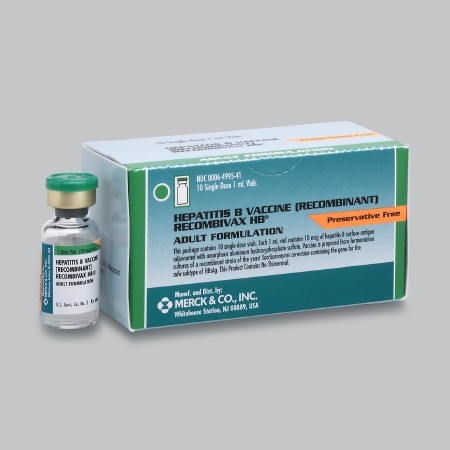
Contents
- 1 Side Effects of Recombivax HB (hepatitis B vaccine)
- 1.0.1 What are the important side effects of Recombivax HB (hepatitis B vaccine)?
- 1.0.2 Recombivax HB (hepatitis B vaccine) side effects list for healthcare professionals
- 1.0.2.1 Clinical Trials Experience
- 1.0.2.2 Incidence Equal To or Greater Than 1% of Injections
- 1.0.2.3 Incidence Less Than 1% of Injections
- 1.0.2.3.1 General Disorders And Administration Site Conditions
- 1.0.2.3.2 Gastrointestinal Disorders
- 1.0.2.3.3 Respiratory, Thoracic And Mediastinal Disorders
- 1.0.2.3.4 Nervous System Disorders
- 1.0.2.3.5 Skin And Subcutaneous Tissue Disorders
- 1.0.2.3.6 Musculoskeletal And Connective Tissue Disorders
- 1.0.2.3.7 Blood And Lymphatic Disorders
- 1.0.2.3.8 Psychiatric Disorders
- 1.0.2.3.9 Ear And Labyrinth Disorders
- 1.0.2.3.10 Renal And Urinary Disorders
- 1.0.2.3.11 Cardiac Disorders
- 1.0.2.4 Post-Marketing Experience
- 1.0.2.4.1 Immune System Disorders
- 1.0.2.4.2 Gastrointestinal Disorders
- 1.0.2.4.3 Nervous System Disorders
- 1.0.2.4.4 Skin and Subcutaneous Disorders
- 1.0.2.4.5 Musculoskeletal and Connective Tissue Disorders
- 1.0.2.4.6 Blood and Lymphatic System Disorders
- 1.0.2.4.7 Psychiatric Disorders
- 1.0.2.4.8 Eye Disorders
- 1.0.2.4.9 Cardiac Disorders
- 1.0.3 What drugs interact with Recombivax HB (hepatitis B vaccine)?
- 1.0.4 Summary
Side Effects of Recombivax HB (hepatitis B vaccine)
Recombivax HB is used to prevent hepatitis B infection caused by the hepatitis B virus (HBV).
It is made from noninfectious parts of HBV using recombinant DNA technology. The vaccine is a sterile preparation for intramuscular injection and contains purified inactive proteins from the surface of HBV.
The proteins can activate the immune system but cannot give rise to a replicating virus. Viral proteins used in Recombivax HB are manufactured in yeast cells using recombinant technology. Recombivax HB stimulates the immune system to attack the viral proteins.
When administered, the body’s immune system recognizes the viral proteins in the vaccine as foreign and develops antibodies against them, providing immunity from future infections. In the event of HBV exposure following vaccination, the body will already be primed to fight the infection.
Common side effects of Recombivax HB include:
- irritability,
- fever,
- diarrhea,
- fatigue,
- weakness,
- reduced appetite,
- cold symptoms,
- headache,
- injections site reactions,
- flushing,
- back pain,
- muscle pain,
- joint pain,
- rash,
- difficulty sleeping,
- dizziness,
- ringing in the ears,
- constipation, and
- taste changes.
Serious side effects of Recombivax HB include:
Drug interactions of Recombivax HB include fingolimod, belimumab, anakinra, adalimumab, infliximab, antineoplastic agents, and other immunosuppressives, which may decrease the effectiveness of Recombivax HB.
No adequate or well-controlled trials of Recombivax HB use in pregnant women. It should be used during pregnancy only if the potential benefit justifies the potential risk to the fetus.
It is unknown if Recombivax HB is excreted into breast milk after administration to the mother. Caution is recommended when given to breastfeeding mothers.
What are the important side effects of Recombivax HB (hepatitis B vaccine)?
Common side effects of HBV vaccines include:
- Irritability
- Fever
- Diarrhea
- Fatigue/weakness
- Reduced appetite
- Cold symptoms
Other reported side effects include:
- Headache
- Injections site reactions
- Low blood pressure
- Flushing
- Back pain
- Muscle pain
- Joint pain
- Rash
- Difficulty sleeping
- Dizziness
- Ringing in the ears
- Seizures
- Hair loss
- Constipation
- Taste changes
Recombivax HB (hepatitis B vaccine) side effects list for healthcare professionals
In healthy infants and children up to 10 years of age, the most frequently reported systemic adverse reactions were:
- irritability,
- fever,
- diarrhea,
- fatigue/weakness,
- diminished appetite, and
- rhinitis.
In healthy adults, injection site reactions and systemic adverse reactions were reported following 17% and 15% of the injections, respectively.
Clinical Trials Experience
Because clinical trials are conducted under widely varying conditions, adverse reaction rates observed in the clinical trials of a vaccine may not reflect the rates observed in practice.
In three clinical studies, 434 doses of Recombivax HB, 5 mcg, were administered to 147 healthy infants and children up to 10 years of age who were monitored for 5 days after each dose. Injection site reactions and systemic adverse reactions were reported following 0.2% and 10.4% of the injections, respectively. The most frequently reported systemic adverse reactions were:
- irritability,
- fever ( ≥ 101°F oral equivalent),
- diarrhea,
- fatigue/weakness,
- diminished appetite, and
- rhinitis.
In a study that compared the three-dose regimen (5 mcg) with the two-dose regimen (10 mcg) of Recombivax HB in adolescents, the overall frequency of adverse reactions was generally similar.
In a group of studies, 3258 doses of Recombivax HB, 10 mcg, were administered to 1252 healthy adults who were monitored for 5 days after each dose. Injection site reactions and systemic adverse reactions were reported at rates of 17% and 15%, respectively. The following adverse reactions were reported:
Incidence Equal To or Greater Than 1% of Injections
General Disorders And Administration Site Conditions
Injection site reactions consisting principally of soreness, and including pain, tenderness, pruritus, erythema, ecchymosis, swelling, warmth, and nodule formation.
The most frequent systemic complaints include fatigue/weakness, headache, fever ( ≥ 100°F), and malaise.
Gastrointestinal Disorders
Respiratory, Thoracic And Mediastinal Disorders
Pharyngitis; upper respiratory infection
Incidence Less Than 1% of Injections
General Disorders And Administration Site Conditions
Sweating; achiness; sensation of warmth; lightheadedness; chills; flushing
Gastrointestinal Disorders
Respiratory, Thoracic And Mediastinal Disorders
Nervous System Disorders
Vertigo/dizziness; paresthesia
Skin And Subcutaneous Tissue Disorders
Pruritus; rash (non-specified); angioedema; urticaria
Musculoskeletal And Connective Tissue Disorders
Arthralgia including monoarticular; myalgia; back pain; neck pain; shoulder pain; neck stiffness
Blood And Lymphatic Disorders
Psychiatric Disorders
Ear And Labyrinth Disorders
Renal And Urinary Disorders
Cardiac Disorders
Post-Marketing Experience
The following additional adverse reactions have been reported with use of the marketed vaccine:
Immune System Disorders
Hypersensitivity reactions including anaphylactic/anaphylactoid reactions, bronchospasm, and urticaria have been reported within the first few hours after vaccination. An apparent hypersensitivity syndrome (serum-sickness-like) of delayed onset has been reported days to weeks after vaccination, including arthralgia/arthritis (usually transient), fever, and dermatologic reactions such as urticaria, erythema multiforme, ecchymoses, and erythema nodosum. Systemic lupus erythematosus, lupus-like syndrome, vasculitis, and polyarteritis nodosa have also been reported.
Gastrointestinal Disorders
Nervous System Disorders
Guillain-Barré syndrome; multiple sclerosis; exacerbation of multiple sclerosis; myelitis including transverse myelitis; seizure; febrile seizure; peripheral neuropathy including Bell’s Palsy; radiculopathy; herpes zoster; migraine; muscle weakness; hypesthesia; encephalitis
Skin and Subcutaneous Disorders
Stevens-Johnson syndrome; alopecia; petechiae; eczema
Musculoskeletal and Connective Tissue Disorders
Pain in extremity
Blood and Lymphatic System Disorders
Increased erythrocyte sedimentation rate; thrombocytopenia
Psychiatric Disorders
Eye Disorders
Optic neuritis; tinnitus; conjunctivitis; visual disturbances; uveitis
Cardiac Disorders
The following adverse reaction has been reported with another Hepatitis B Vaccine (Recombinant) but not with Recombivax HB:
What drugs interact with Recombivax HB (hepatitis B vaccine)?
Concomitant Administration With Other Vaccines
- Do not mix Recombivax HB with any other vaccine in the same syringe or vial. Use separate injection sites and syringes for each vaccine.
- In clinical trials in children, Recombivax HB was concomitantly administered with one or more of the following US licensed vaccines: Diphtheria, Tetanus and whole cell Pertussis; oral Poliomyelitis vaccine; Measles, Mumps, and Rubella Virus Vaccine, Live; Haemophilus b Conjugate Vaccine (Meningococcal Protein Conjugate)] or a booster dose of Diphtheria, Tetanus, acellular Pertussis. Safety and immunogenicity were similar for concomitantly administered vaccines compared to separately administered vaccines.
- In another clinical trial, a related HBsAg-containing product, Comvax [Haemophilus b Conjugate (Meningococcal Protein Conjugate) and Hepatitis B (Recombinant) Vaccine], was given concomitantly with eIPV (enhanced inactivated Poliovirus vaccine) or Varivax [Varicella Virus Vaccine Live (Oka/Merck)], using separate sites and syringes for injectable vaccines. No serious vaccine-related adverse events were reported, and no impairment of immune response to these individually tested vaccine antigens was demonstrated.
- Comvax has also been administered concomitantly with the primary series of DTaP to a limited number of infants. No serious vaccine-related adverse events were reported.
Concomitant Administration With Immune Globulin
- Recombivax HB may be administered concomitantly with HBIG. The first dose of Recombivax HB may be given at the same time as HBIG, but the injections should be administered at different sites.
Summary
Recombivax HB is used to prevent hepatitis B infection caused by the hepatitis B virus (HBV). Common side effects of Recombivax HB include irritability, fever, diarrhea, fatigue, weakness, reduced appetite, cold symptoms, headache, injections site reactions, flushing, back pain, muscle pain, joint pain, rash, difficulty sleeping, dizziness, ringing in the ears, constipation, and taste changes. It should be used during pregnancy only if the potential benefit justifies the potential risk to the fetus. It is unknown if Recombivax HB is excreted into breast milk after administration to the mother.


